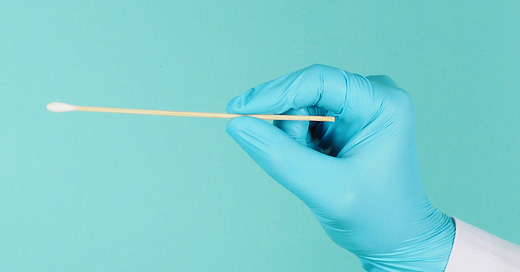Let’s talk about Group B Strep (GBS), a common bacteria that many pregnant people have but might not even know about because it usually causes us zero issues. So why do we care about it when you’re pregnant??
About 20-30% of women and folks with a vagina carry GBS in their vagina and rectum. Now, this isn’t something you pick up from poor hygiene or a sexually transmitted infection—it's just one of those things that is on the spectrum of normal. The only time it really becomes important is during pregnancy because of the potential effects on your baby.
So What’s the Big Deal About GBS?
GBS can be passed to your baby during delivery as they make their grand entrance through the birth canal. Without antibiotics, babies exposed to GBS during birth have a 5-50% chance of becoming infected. Certain factors like having a fever during labor or delivering preterm can increase this risk.
If a newborn gets a GBS infection, it can lead to serious issues in the lungs, bloodstream, or nervous system. To help prevent this, all pregnant patients are screened for GBS between 36-38 weeks. It’s a simple test—just a quick swab of your vagina and rectum. If GBS is found in your urine earlier in pregnancy, you'll skip the swab since it’s already clear that you're a carrier.
How Do We Keep Baby Safe?
If you test positive for GBS, don’t worry—there’s an easy fix. During labor, your doctor or midwife will give you IV antibiotics, usually penicillin, to lower the chances of passing GBS to your baby. Ideally, the antibiotics should be started at least 4 hours before delivery. Thanks to this screening and treatment, GBS infections in newborns are now quite rare—only 0.5 per 1,000 live births!
You might wonder if having GBS means you need a C-section, but that’s not the case at all. A C-section isn’t necessary just because you test positive for GBS.
Can GBS Affect Me, Too?
In some cases, having a lot of GBS in your urine can cause symptoms similar to a urinary tract infection, which can be treated with oral antibiotics. GBS can also slightly increase the risk of a uterine infection during or after delivery, but there’s no strong evidence that treating GBS before labor helps prevent these issues.
Can I Use Alternative Treatments to Get Rid of GBS If I Test Positive?
While you might hear about alternative treatments like dietary changes, placing garlic in the vagina, or colloidal silver to “clear” your GBS before you give birth, there’s no scientific proof that they work. And since when we know antibiotics can make such a huge difference in keeping babies out of the NICU and from getting sick, there’s a reason we feel strongly about not going down this alternative route.
You are always free to choose what to do with your body (and no one can force you to have IV antibiotics in labor), but know that it does mean the pediatric team may want to watch your baby in the hospital more closely to watch for a developing GBS infection.
Until next time,
Dr. Jen
References:
2. Ohlsson A, Shah VS. Intrapartum antibiotics for known maternal Group B streptococcal colonization. Cochrane Database Syst Rev. 2014 Jun 10;(6):CD007467. doi: 10.1002/14651858.CD007467.pub4. PMID: 24915629.






